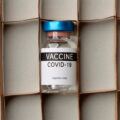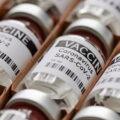The Vatican’s complex history with vaccines
The Vatican’s complex history with vaccines
In early January 2021, Pope Francis implied that getting the COVID-19 vaccine is an ethical obligation – a noteworthy step considering the Vatican’s position towards vaccines has been a mixed one. This article explores how the Vatican’s views towards “morally-tainted” vaccines have evolved since their early circulation.
Vaccine to pope and pope emeritus
On January 14, 2021, the Vatican’s novel COVID-19 vaccination campaign achieved a significant milestone as officials confirmed both Pope Francis and Pope Emeritus Benedict XVI had received their first doses of the vaccine.[1] [2] Beyond bringing the pope, whose age and medical history make him particularly vulnerable to the virus, closer to COVID-19 immunity, the move also served as a powerful seal of approval for the vaccine, an issue over which several Catholics have expressed moral concerns.
Catholics who have raised ethical questions over the vaccine have not done so from a fundamental disagreement with the idea of vaccines, as some other religions do, but rather over how vaccine development is conducted.[3] While some vaccines are created in living tissue harvested from animal, insect, or plant cells, others use stem cells developed from aborted foetuses. The abortion may have happened decades before – in fact, most stem cell lines originate from foetuses aborted in the 70s and 80s.[4] The cells are then manipulated to allow indefinite replication, thereby allowing scientific experimentation years into the future.[5]
Yet, to some Catholics, this makes little to no difference. To use a vaccine that benefitted, however marginally, from these cell lines would, in essence, endorse the abortion and potentially encourage further procedures. As of early 2021, the leading vaccines in Europe all utilised foetal cell lines at some point in either the development or assessment process.[6] How is it, then, that the pope freely took the vaccine, even going so far as to declare it an ethical obligation for other Catholics?
Understanding this issue first requires a glance back several decades, to the earlier uses of stem cell line technology.
Origins of anti-vaccine thought: Charter of the Rights of the Family & Donum Vitae
In 1983, the Vatican entered the discussion surrounding research performed on embryos, declaring in the Charter of the Rights of the Family that “[r]espect of the dignity of the human being excludes all experimental manipulation or exploitation of the human embryo.”[7] Wishing to further clarify moral questions raised by new technological advances, the Congregation for the Doctrine of the Faith, one of the departments of the Roman Curia in the Vatican, issued in 1987 an ‘Instruction on Respect for Human Life in Its Origin and on the Dignity of Procreation’, (or Donum Vitae). Within it, the Congregation firmly held that there were no possible goals, however noble or beneficial, that could justify experimentation on embryos or foetuses.[8] For some Catholics, the beliefs underlying these documents were tantamount to a spiritual ban on receiving vaccines that involved, at some point in the process, aborted foetal stem cell lines.[9] [10]
The measles debate – a Vatican vaccine microcosm
Living by such rules, however, creates both practical and health-related concerns, as several widespread vaccines, including measles, used such cells in the process.[11] Furthermore, many European countries require children to receive some of these vaccines before attending public schooling.[12] [13] [14] Can Catholic parents object? Must they?
In 2003 to address this concern, Debra L. Vinnedge, the Executive Director of a US-based organisation called Children of God for Life, aimed at eliminating the use of aborted foetuses in science, wrote to the Vatican. In her letter, addressed to Cardinal Ratzinger who would later become Pope Benedict XVI, Vinnedge asked for clarification as to how Catholic parents should proceed regarding vaccines generated using aborted foetal stem cell lines.[15]
Over the next two years, several groups within the Vatican took up the question and eventually issued a formal report entitled: ‘Moral Reflections on Vaccines Prepared from Cells Derived from Aborted Human Foetuses’. The document details the different types of what it deems “licit cooperation in evil” involved in the multi-stepped process from abortion to vaccine.[16] While identifying a small amount of abortion-supporting complicity for those who receive the vaccine, the paper ultimately concludes that if there are “considerable dangers” to health and no alternative vaccines, then “vaccines with moral problems pertaining to them may also be used on a temporary basis.” The measles vaccine, it added, certainly fits this bill. Parents, however, bear a responsibility to request and call for other vaccines to be made, ones that did not include the use of embryonic stem cell lines.[17]
This line of argument received further support with the publication, in 2008, of ‘Instruction Dignitas Personae‘, a supplement to Donum Vitae, updated with new argumentation. In it, the Congregation noted that concern over a child’s health could justify the use of a vaccine that employed abortion stem cell lines at some point in the process.[18]
In 2017, following the rise of anti-vaccine sentiment in Italy, the Vatican, via the Pontifical Academy for Life – an honorary society tasked with promoting the Vatican’s views on the sanctity of life – issued an even clearer statement, explicitly encouraging Catholics to have their children vaccinated.[19] In it, the Church addressed similar concerns as in its previous statements, yet went further to declare that the distance between the original abortion and the administration of vaccines essentially eliminates any “morally relevant cooperation.”[20] Catholics, therefore, could get vaccinated in good conscience.
And the COVID-19 vaccine?
As pandemic-induced economic standstills have bled into 2021, many have looked to a growing number of vaccines as a means of escape. With that, however, have been familiar calls of the vaccines’ immorality.
To better understand the calls, it is best to overview the entire vaccination process. There are generally three phases: (1) development – when scientists create the vaccine, (2) confirmation – when scientists ensure the vaccine works, and (3) production – when companies manufacture the vaccine.[21] For two leading vaccines as of early 2021 (Moderna and Pfizer/BioNTech), foetal cell lines were used only in the confirmation process, not during the development or production processes.[22] [23] In other words, the vaccines did not derive from foetal tissue nor would the final product contain foetal tissue. However, some groups used abortion stem cell lines to verify that the vaccines produced immune responses. The Oxford AstraZeneca vaccine, which was developed along more traditional lines (that is not using mRNA), did use abortion stem cell lines in the production process. Again, however, the final product has no stem cell tissue.[24]
Correspondingly, some religious figures raised concerns.[25] Addressing them, the Congregation for the Doctrine of the Faith released a statement in December 2020, announcing that receiving any of the vaccines, given the lack of alternatives that did not involve cell lines and the several scientific steps of removal from the original abortion, would be morally acceptable.[26] [27]
Shortly before receiving his vaccine, Pope Francis went further, declaring that not only was it morally acceptable, it was an ethical obligation to receive the vaccine – as it would help save lives.[28]
While the Church still condemns abortions and scientific research on aborted tissue, it has generally adopted the view that receiving vaccines – both common childhood ones, like measles and chickenpox, and newly developed ones for COVID-19 – do not make one complicit. In fact, the Church appears to have adopted newer, more pressing concerns involving vaccines and morality: vaccine distribution and disease elimination. Moral attention seems to have transitioned from how the vaccines are produced to (1) where they are going and ensuring that the wealthier nations of the world share with countries in need and (2) encouraging people to get vaccinated not only to protect themselves, but also their neighbours.[29] [30] [31]
Interested in similar topics? Go to our Dashboard and get free updates.
[1] Pope Francis and the Pope emeritus receive COVID-19 vaccine
[2] Pope Francis, ex-pope Benedict get virus vaccines: Vatican
[3] While this article focuses largely on the concerns surrounding abortion and vaccine development, see EARS’s earlier article Will the COVID-19 vaccine be ethically tainted? for a more thorough overview of all ethical concerns.
[4] You asked, we answered: Do the COVID-19 vaccines contain aborted fetal cells?
[5] How cells taken from decades-old fetal tissue are used in Covid-19 drug research
[6] Abortion opponents protest COVID-19 vaccines’ use of fetal cells
[7] Charter of the Rights of the Family
[8] Instruction on Respect for Human Life in its Origin and on the Dignity of Procreation
[9] Vaccines and other entanglements with abortion
[10] Religious exception for vaccination or religious excuses for avoiding vaccination
[11] Scientists say fetal tissue remains essential for vaccines and developing treatments
[12] How growing numbers of EU countries are making vaccines mandatory
[13] Mandatory Vaccination in Europe
[14] Amid Measles Outbreak, Italy Makes Childhood Vaccinations Mandatory
[15] Moral Reflections on Vaccines Prepared from Cells Derived from Aborted Human Foetuses
[16] Moral Reflections on Vaccines Prepared from Cells Derived from Aborted Human Foetuses
[17] Moral Reflections on Vaccines Prepared from Cells Derived from Aborted Human Foetuses
[18] Instruction Dignitas Personae – On Certain Bioethical Questions
[19] Vatican’s Academy for Life encourages parents to vaccinate children
[20] Note on Italian vaccine issue
[21] You asked, we answered: Do the COVID-19 vaccines contain aborted fetal cells?
[22] You asked, we answered: Do the COVID-19 vaccines contain aborted fetal cells?
[23] Fact check: Lung tissue of an ‘aborted male foetus’ is not in the vaccine for coronavirus
[24] Foetal cells are used to make the Oxford coronavirus vaccine. But they came from a foetus in 1973
[25] Again, for further discussion see Footnote 3.
[26] Vatican: OK to get virus vaccines using abortion cell lines
[27] Covid: Vatican says coronavirus vaccines ‘morally acceptable’
[28] COVID-19 : “Il faut se faire vacciner”, exhorte le pape, qui le fera “la semaine prochaine”
[29] Pope says coronavirus vaccine must be shared worldwide
[30] In Christmas message curbed by COVID, pope calls on nations to share vaccines
[31] COVID-19 : “Il faut se faire vacciner”, exhorte le pape, qui le fera “la semaine prochaine”






